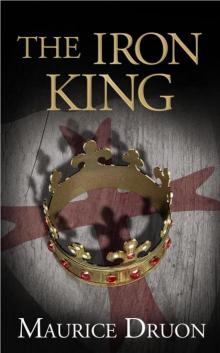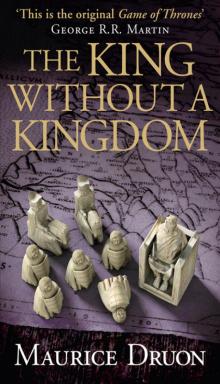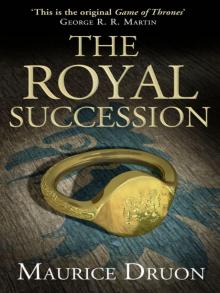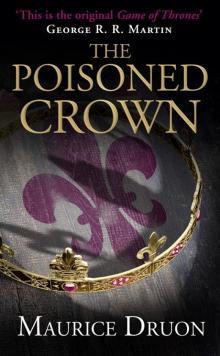- Home
- Maurice Druon
The Lily and the Lion Page 6
The Lily and the Lion Read online
Page 6
He turned first one way and then the other, advanced and retreated a couple of steps, but could see his reflection only in fragments, split up into pieces like a figure in a church window: on the left, the gold hilt of his long sword and, a little higher to the right, part of his chest where his silk surcoat showed his embroidered arms; here the shoulder to which the great peer’s mantle was fastened with a glittering clasp, and there, near the ground, the fringe of the long mantle falling on the gold spurs; and then, crowning it all, the great peer’s coronet with eight identical fleurons, set with the rubies he had bought at the late Queen Clémence’s sale.
‘Well, I’m worthily apparelled,’ he said. ‘It would be a great pity if I were not a peer, for the mantle suits me well.’
The Countess of Beaumont, also wearing state robes, did not altogether seem to share her husband’s satisfaction.
‘Are you quite sure, Robert,’ she asked anxiously, ‘that this woman will arrive in time?’
‘Of course, of course,’ he replied. ‘Even if she doesn’t come this morning, I shall make my claim, and present the papers tomorrow.’
The only drawback to Robert’s costume was the heat of early summer. He was sweating under the cloth-of-gold, the velvet and the thick silk, and though he had taken a hot bath that morning he was beginning to give off a smell like a wild beast.
Through the window, which was open on to a bright and sunny sky, the cathedral bells could be heard ringing a full peal, drowning the clatter in the town of the trains of the five kings and their Courts.
For, indeed, on this June 6th, 1329, there were five kings in Amiens. No chancellor could remember such a gathering. To receive the homage of his young cousin of England, Philippe VI had invited his relations and allies, the Kings of Navarre, Bohemia and Majorca, as well as the Count of Hainaut, the Duke of Athens and all the peers, dukes, counts, bishops, barons and marshals.
There were six thousand French horsemen and six hundred English. Charles of Valois would not have disowned his son, nor indeed his son-in-law, Robert of Artois, had he been able to see such an assembly.
The new Constable, Raoul de Brienne, had had to organize the billeting as his first duty. He had done it well, but had lost half a stone in the process.
The King of France and his family were occupying the Bishop’s Palace, of which a wing had been allotted to Robert of Artois.
The King of England had been installed in the Malmaison,8 and the other kings in various burgesses’ houses. The servants slept in the passages, the grooms camped outside the town with the horses and baggage-trains.
An enormous crowd had come in from the immediate countryside, the neighbouring counties, and even from Paris. The less fortunate slept under porches.
While the chancellors of the two kingdoms were arguing once more about the terms of the homage, since even after so much negotiation no precise formula had yet been established, the whole nobility of Western Europe spent six consecutive days in jousting and tournament, being entertained by masks, jugglers and dances, and feasting spendidly from noon to starlight in the palace gardens.
Market-gardeners,9 punting their flat-bottomed boats through the narrow canals into Amiens, were bringing irises, buttercups, hyacinths and lilies to the water-market. These were spread in the streets, courtyards and halls through which the kings passed. The town was saturated with the scent of crushed flowers, of pollen sticking to men’s boots, and it mingled with the strong odours of the horses and the crowds.
And the food, the wine, the meat, the spices and the cakes! Pigs, sheep and bullocks were being driven in continuous procession to the slaughterhouses which were working night and day; trains of wagons brought the palace kitchens bucks, stags, wild boar, roe-deer, and hares; sturgeon, salmon and mullet from the sea; pike, bream, tench and crayfish from the rivers; and poultry and game of all kinds, fine capons, fat geese, resplendent pheasants, swans, pale herons and peacocks with tails full of eyes, Barrels of wine were on tap everywhere.
Anyone who wore a lord’s livery, down to the most junior lackey, put on an air of importance. The prostitutes were in a frenzy. The Italian merchants had gathered from the ends of the earth for this fabulous fair organized by the King. The façades of the houses were hidden by the silks, brocades and tapestries hanging gaily from the windows.
There were too many bells and fanfares, too much shouting, too many palfreys and dogs, too much food and drink, too many princes and pickpockets, too many whores, too much luxury, too much gold, and too many kings. It made one’s head spin.
The kingdom was intoxicated by the sight of its own power, as Robert of Artois was intoxicated by his reflection in the mirrors.
Lormet, his old valet, who in spite of a new livery was spending his time grumbling amid the general rejoicing – largely because Gillet de Nelle was becoming too important in the household and because there were too many new faces about his master – came in and murmured: ‘The lady you were expecting has arrived.’
Robert turned quickly.
‘Show her in,’ he said.
He winked meaningly at the Countess, and waving his arms drove everybody towards the door, shouting: ‘Get out, all of you! Form up in procession in the courtyard.’
For a moment he stood alone by the window, looking out on the crowd which had gathered in front of the cathedral to watch the great go in; a cordon of archers was finding some difficulty in controlling it. The bells above were still pealing; the scent of hot pancakes suddenly floated up to him from a stall; all the neighbouring streets were full of people; and the Hoquet Canal was so crowded with boats that the glimmer of the water was scarcely visible.
Robert of Artois felt triumphant, and he would feel even more so shortly, when he went up to his Cousin Philippe in the cathedral and uttered certain words that would make the assembled kings, dukes and barons start in surprise. None would emerge as happy as he went in; and this would be particularly true of his dear Aunt Mahaut and the Duke of Burgundy.
He would certainly be wearing his peer’s robes for the first time to advantage! Twenty years and more of stubborn struggle would receive their reward today. And yet, behind his pride and joy, he felt a sense of regret. What could be the cause of it when fate was smiling on him and all his hopes were coming true? Then suddenly he knew: it was the smell of pancakes. A peer of France, who was about to claim the county of his ancestors, could not go down into the street wearing his coronet with eight fleurons and eat a pancake. A peer of France could not loiter about the streets, mingle with the multitude, tweak a girl’s breast, and go brawling through the night in company with half a dozen whores, as he used to do when he was poor and twenty. Yet his nostalgia reassured him. ‘Anyway,’ he thought, ‘the life’s not dead in me yet!’
His visitor was standing shyly by the door, not daring to disturb the thoughts of a lord in so splendid a coronet.
She was a woman of about thirty-five, with a triangular face and high cheekbones. The hood of her travelling-cloak revealed plaited tresses, and her full, rounded bosom heaved beneath her white linen bodice as she breathed.
‘By God, the Bishop had good taste!’ thought Robert, when he turned and saw her.
She bent a knee in a curtsy. He held out his huge gloved hand with its ruby rings.
‘Give them to me,’ he said.
‘I haven’t got them, Monseigneur,’ she replied.
There was a sudden change in Robert’s expression.
‘Do you mean to say you haven’t got the papers?’ he cried. ‘You promised me to bring them today!’
‘I’ve come straight from the Château d’Hirson, Monseigneur. I went there yesterday with Sergeant Maciot. We opened the iron wall-safe with skeleton keys.’
‘Well?’
‘Someone had been there before us. It was empty.’
‘What splendid news!’ cried Robert, who had turned rather pale. ‘You’ve been trifling with me for a whole month. “Monseigneur, I can give you the deeds that will put
you in possession of your county! I know where they are. Give me an estate and an income, and I’ll bring them to you next week …” And then that week goes by, and then another … “The Hirson family are in the château; I can’t go there when they’re in residence …” “I’ve now been there, Monseigneur, but the key I had with me was not the right one. Have a little patience …” And now, on the very day I’ve got to produce the two documents to the King …’
‘The three documents, Monseigneur: the marriage contract of your father, Count Philippe, the letter from Count Robert, your grandfather, and Monseigneur Thierry’s letter …’
‘Very well then! The three of them! And now you come here and say foolishly: “I haven’t got them; the safe was empty!” Do you expect me to believe you?’
‘Ask Sergeant Maciot, who went with me! Don’t you realize, Monseigneur, that I’m even more distressed than you are?’
There was a wicked and suspicious glint in Robert’s eyes. ‘Tell me, La Divion’, he said in a different tone of voice, ‘are you by any chance trying to double-cross me? Is this an attempt to extract more money from me, or have you betrayed me to Mahaut?’
‘How can you even think of such a thing, Monseigneur?’ she cried on the verge of tears. ‘All my difficulties and my poverty are due to the Countess of Mahaut who stole everything my dear Seigneur Thierry left me in his will. I wish Madame Mahaut all the harm you can do her. Just think, Monseigneur, I was Thierry’s mistress for twelve years. Many people cut me because of it, but after all a bishop’s a man like another! People are so unkind …’
She began telling Robert her story all over again, though he had already heard it three times at least. She talked quickly; her eyes, beneath her straight brows, had the curious inward look of the utterly self-centred, of people whose thoughts are entirely and unceasingly concentrated on their own affairs.
She could obviously expect no help from her husband, whom she had left to go and live with Bishop Thierry. She realized that on the whole her husband had been very accommodating, perhaps because he had early ceased to be a man (Monseigneur would understand what she meant). It was to save her from poverty and in gratitude for all the happy years she had given him that Bishop Thierry had put her down in his will for several houses, a sum in gold and an annuity. But he had been afraid of Madame Mahaut and had felt obliged to appoint her his executrix.
‘She always disliked me, because I was younger than she was, and because Thierry in the past – he told me so himself – had been compelled to pleasure her. He was well aware that she would treat me badly when he was no longer there to protect me, and that the Hirsons, who are all against me – particularly Beatrice, Madame Mahaut’s lady-in-waiting, who is the worst of the lot – would contrive to throw me out of the house and deprive me of everything due to me …’
Robert had ceased to listen to her interminable complaints. He put his heavy coronet down on a chest and scratched his red head in thought. His splendid scheme was falling to the ground, for it was entirely dependent on the production of the documents. ‘Just one convincing little document, Brother, and I shall at once order a review of the judgements of 1309 and 1318,’ Philippe VI had said. ‘But you must realize that I can do nothing without that, however great my wish to serve you, or I shall be breaking my word to Eudes of Burgundy, with all the consequences that you can imagine.’ And it was no small document, but the highly important papers Mahaut had stolen so as to be able to lay her hand on the Artois inheritance that he had boasted of being able to produce!
‘And in a few minutes’ time,’ he said, ‘I have to be in the cathedral for the homage.’
‘What homage?’ asked La Divion.
‘The King of England’s, of course!’
‘Oh, so that’s why the town’s so crowded I could scarcely push my way through.’
So this fool of a woman saw nothing, heard nothing and knew nothing, so busy was she with her own ridiculous little concerns!
It occurred to Robert that he had perhaps been unwise to credit this woman’s tale; he began to doubt whether the documents, the safe at Hesdin and the Bishop’s confession had ever existed outside her imagination. And was Maciot l’Allemant also a dupe, or had he connived with her?’
‘Tell the truth, woman! You’ve never seen these documents!’
‘But I have, Monseigneur!’ cried La Divion, pressing her hands to her prominent cheeks. ‘It was at the Château d’Hirson, the day Thierry fell ill, before he had himself carried to his Hôtel d’Arras. “My Jeannette, I want to forearm you against Madame Mahaut, as I forearmed myself,” he said. “The documents she stole from the archives in order to rob Monseigneur Robert were not destroyed as she believes. Those from the Paris archives were burnt in her presence; but the duplicates from the Artois archives” – these are Thierry’s very words, Monseigneur – “I have always kept here, though I told her they had been destroyed too, and I have added a letter in my own hand to them.” Then Thierry took me to the safe concealed in the wall of his study, and gave me the documents to read. They all had seals on them; and I could hardly believe my eyes when I saw what villainy had been done. There were also eight hundred livres in gold in the safe. And he gave me the key in case anything happened to him …’
‘And when you went to Hirson the first time?’
‘I mixed up the keys. I think I must have lost the right one. I really do seem to have the most extraordinary bad luck. And once things start going wrong …’
She was off again. But Robert felt she was speaking the truth; people did not invent such a stupid story when they set out to deceive. He would have strangled her with pleasure could it have served any useful purpose.
‘My going there must have given the alarm,’ she added. ‘They found the safe and forced the locks. I’m sure it was that Beatrice …’
Lormet put his head in at the door. Robert waved him away.
‘But after all, Monseigneur,’ Jeanne de Divion said, as if she were trying to make amends for her failure, ‘don’t you think the documents could be easily reproduced?’
‘Reproduced?’
‘After all, we know what they said! I can repeat Monseigneur Thierry’s letter almost word for word …’
Vague of eye and waving a finger in emphasis, she began reciting:
‘“I feel greatly guilty that I have for so long concealed the fact that the right to the County of Artois belongs to Monseigneur Robert by the agreements made at the marriage of Monseigneur Philippe of Artois and Madame Blanche of Brittany, which were drawn up in duplicate and sealed. Of these deeds I hold one copy, and the other was subtracted from the archives of the Court by one of our great lords … I have always intended that, after the death of Madame the Countess at whose desire and on whose orders I have acted, should God call her to Himself before me, restoration should be made to the said Monseigneur Robert of the deeds I have in my possession …”’
La Divion might lose keys, but she could remember a once-read text. There were no doubt minds made that way. And now she was suggesting to Robert, as if it were the most natural thing in the world, that he should commit forgery. She obviously had no sense whatever of right and wrong, could make no distinction between the moral and the immoral, the permissible and the forbidden. Morality was what happened to suit her. Robert, during the course of his forty-two years, had committed almost every conceivable crime. He had killed, lied, denounced, pillaged and raped. But he had not yet been a forger.
‘There is also the old bailiff of Béthune, Guillaume de la Planche, who must remember things that could help us, for he was Monseigneur Thierry’s clerk at the time.’
‘Where is this old bailiff?’ Robert asked.
‘In prison.’
Robert shrugged his shoulders. Things were going from bad to worse. He had made a grave mistake to be so hasty. He ought to have waited until he had the documents actually in his hands before giving so many assurances. On the other hand, the King himself had advised him to make use o
f the occasion of the homage.
Old Lormet put his head in at the door again.
‘All right, I’m coming,’ Robert said impatiently. ‘There’s only the square to cross.’
‘The King’s making ready to go down,’ Lormet said reproachfully.
‘Very well, I’m coming.’
When all was said and done, the King was his brother-in-law and, what was more, only King because he, Robert, had so desired it. How hot it was! He felt the sweat running down under his peer’s robes.
He went to the window, and looked out at the cathedral and its two asymmetrical, fretted towers. The sun was shining at an angle on the great rose window. The bells were still pealing and drowning the noise of the crowd.
The Duke of Brittany, followed by his suite, was mounting the steps to the central porch.
Twenty yards behind him, the lame Duke of Bourbon followed, two pages carrying the train of his mantle.
Behind them again, came Mahaut of Artois’ retinue. She had good reason to walk with so firm a step today! Taller than most men, her face crimson, she was acknowledging the greetings of the people with slight but imperious inclinations of the head. There went a criminal, a liar, a poisoner of kings, and a thief who had stolen documents from the royal archives. And now, on the very point of confounding her, of being victorious at last, after twenty years of effort, he was going to be compelled to renounce his triumph. And why? Because a bishop’s concubine had lost a key!
Was there not justification for using base means against the base? Should one be over-nice about the means one employed to bring about the triumph of right?
And, after all, when you came to think of it, if Mahaut did possess the documents from the safe at Château d’Hirson – even if she had not immediately destroyed them, which she probably had – she could certainly never produce them or allude to their existence, since they were proof of her guilt. If similiar documents were produced in evidence against her, she would be caught. It was a pity he had not the whole day in front of him in which to think it over and get more information. He had to make his mind up within the hour, and entirely on his own.

 The Iron King
The Iron King The King Without a Kingdom
The King Without a Kingdom The Accursed Kings Series Books 1-3: The Iron King, the Strangled Queen, the Poisoned Crown
The Accursed Kings Series Books 1-3: The Iron King, the Strangled Queen, the Poisoned Crown The She-Wolf
The She-Wolf The Lily and the Lion
The Lily and the Lion The Royal Succession
The Royal Succession The Strangled Queen
The Strangled Queen The Poisoned Crown
The Poisoned Crown